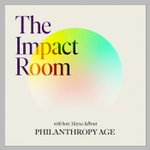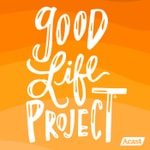The Impact Room – Détails, épisodes et analyse
Détails du podcast
Informations techniques et générales issues du flux RSS du podcast.

The Impact Room
Philanthropy Age
Fréquence : 1 épisode/40j. Total Éps: 28

The Impact Room is a space to connect people and ideas that make a real difference to our world. Step inside to hear stories of success and failure from a host of global guests, all working to solve some of the world’s most intractable development challenges. From youth unemployment and internet freedom, to modern slavery, neglected tropical diseases, and much more, we will be talking to and about the people and ideas that make a real difference to our world. The Impact Room is brought to you by Philanthropy Age and hosted by Maysa Jalbout.
Classements récents
Dernières positions dans les classements Apple Podcasts et Spotify.
Apple Podcasts
🇺🇸 États-Unis - nonProfit
27/07/2025#80🇺🇸 États-Unis - nonProfit
26/07/2025#48🇫🇷 France - nonProfit
19/07/2025#100🇫🇷 France - nonProfit
18/07/2025#99🇫🇷 France - nonProfit
17/07/2025#91🇫🇷 France - nonProfit
16/07/2025#82🇫🇷 France - nonProfit
15/07/2025#69🇫🇷 France - nonProfit
14/07/2025#61🇫🇷 France - nonProfit
13/07/2025#60🇫🇷 France - nonProfit
12/07/2025#56
Spotify
Aucun classement récent disponible
Liens partagés entre épisodes et podcasts
Liens présents dans les descriptions d'épisodes et autres podcasts les utilisant également.
See all- https://www.priyaparker.com/
31 partages
- https://jalboutmaysa.com/
31 partages
- https://twitter.com/PhilanthropyAge
11 partages
- https://twitter.com/MaysaJalbout
8 partages
- https://en.wikipedia.org/wiki/Main_Page
19 partages
Qualité et score du flux RSS
Évaluation technique de la qualité et de la structure du flux RSS.
See allScore global : 83%
Historique des publications
Répartition mensuelle des publications d'épisodes au fil des années.
Gaza: the war on education
Saison 4 · Épisode 7
mardi 2 juillet 2024 • Durée 27:52
We'd love your feedback. Let us know what you thought about this episode.
With all 12 of Gaza’s higher education institutions destroyed by Israeli bombs, what next for students, faculty, and the future of Palestinian learning?
In this episode of The Impact Room, host Maysa Jalbout, explores the impact of the war on higher education in Gaza, on both students and teaching staff, as well as the institutions themselves.
We feature interviews with academics trying to keep university teaching going, against all the odds, hear personal stories about life under bombardment, and offer practical ways everyone can help counter the educide.
This episode was recorded on Thursday June 27 – day 265 of the conflict. If you haven’t already, make sure you listen to our earlier interviews with Palestinian medic Dr Ghassen Abu Sittah, and PCRF founder, Steve Sosebee.
Education is central to Palestinian identity and has been an active form of resilience for a people who have for generations had their homes, rights, and livelihoods stolen. It is well known that despite all the challenges of living under occupation, literacy rates in Gaza are among the highest in the world.
In a bid to keep people learning, An Najah National University in the West Bank, in partnership with UNIMED, the Mediterranean Universities Union, and the Palestinian Student Scholarship Fund (PSSF), is spearheading an initiative to share technology and resources to create an e-learning scheme for students in Gaza.
The main aim, explains Dr Saida Affouneh, An Najah's dean of the Faculty of Education, is to keep students and lectures in Gaza to protect the long-term health of institutions and stem the brain drain out of Palestine.
Dr Ihab Nasr, the Dean of Applied Medical Sciences at Al Alzhar University, is one of many academics who has chosen to leave Gaza. He spoke to The Impact Room from Edmonton, Canada, where he has moved to begin a new life with his wife and five children. Dr Nasr is currently teaching nutrition modules via Birzeit University in the West Bank as part of the Rebuilding Hope initiative.
Also working to support students in Gaza is Professor Mahmoud Loubani, a UK-based cardiothoracic surgeon and chair of PalMed Academy, a branch of PalMed Europe, which promotes better healthcare for Palestinians at home and overseas.
In March this year, PalMed Academy launched the Gaza Educate Medics (GEM) initiative to establish a virtual medical college, leveraging the expertise of volunteering academics and consultants worldwide to educate Gaza’s medical students.
Brian Cox was reading “If I must die”, the last poem written by Palestinan academic Refaat Alareer.
The Impact Room is brought to you by Philanthropy Age and Maysa Jalbout. Find us on social media @PhilanthropyAge
Dr Ghassan Abu-Sittah on Gaza's suffering
Saison 6 · Épisode 6
lundi 1 avril 2024 • Durée 33:16
We'd love your feedback. Let us know what you thought about this episode.
Dr Ghassan Abu-Sittah is no stranger to conflict zones, having spent decades volunteering for medical charities in Palestine, Lebanon, Yemen, Syria, and Iraq. But the plastic and reconstructive surgeon says his latest experience in Gaza has no parallel.
The scale of the current suffering in Gaza, “the intensity, the ferocity, the viciousness, and the deliberate targeting of the hospitals”, he says, was like "a tsunami”.
Dr Abu-Sittah travelled to Gaza days after Israel began its bombardment in response to the October 7 attack by Hamas. He remained in the besieged enclave for 43 days, working mainly in northern Gaza as a volunteer for Médecins Sans Frontières (MSF).
He was at Al-Ahli Hospital during the massacre on October 17, 2023, and was among the physicians who spoke to news media, surrounded by blood-stained bodies, in the attack’s immediate aftermath. He later gave evidence to the International Court of Justice (ICJ) at The Hague about what he saw.
In this moving interview with Maysa Jalbout, Dr Abu-Sittah shares his experiences of working in Gaza and what it was like knowing his wife and children were watching him caught up in the attacks in real time on social media.
Since returning home to the UK, he has announced plans to set up The Ghassan Abu Sittah Children’s Fund to pay for injured Palestinians to receive medical and rehabilitation treatment in Lebanon.
Children have borne the brunt of this latest chapter of conflict in Palestine. Before October 7, there were nearly 200 war-related amputations among young people in Gaza as well as some 2,000 adults living with amputations from earlier conflicts. Dr Abu Sittah says there could now be as many as 5,000 child amputees, with many losing limbs due to an inability to treat what would ordinarily be very salvageable injuries.
Children with amputations need new prosthetics every six to eight months as they grow and could require as many as 12 surgeries before they reach adulthood, he explained. In addition to the physical impact of their injuries, their mental health needs are also “life altering”.
Dr Abu-Sittah was born in Kuwait after his parents were forced from their homes in Palestine in 1948 and became refugees in Gaza. He studied medicine at the University of Glasgow and after completing his Specialist Registrar training in London, he went on to do fellowships in Paediatric Craniofacial Surgery and Cleft Surgery at Great Ormond Street Hospital for Sick Kids and then a fellowship in Trauma Reconstruction at the Royal London Hospital. In 2010 he was awarded Fellowship of the Royal College of Surgeons (Plastic Surgery).
Dr Abu-Sittah has served as an associate professor and head of the Division of Plastic and Reconstructive Aesthetic Surgery at the American University of Beirut (AUB) Medical Center, in 2015, became a founding director of the Conflict Medicine Program at AUB’s Global Health Institute, and in March was named Rector of the University of Glasgow.
The Impact Room is brought to you by Philanthropy Age and Maysa Jalbout. Find us on social media @PhilanthropyAge
Who cares? The case for investing in the early years
Saison 3 · Épisode 4
mercredi 12 avril 2023 • Durée 42:56
We'd love your feedback. Let us know what you thought about this episode.
Ninety percent of children's brains are developed by the age of five - yet around the world, millions of young people are missing out on adequate nutrition, care, and stimulating play, causing them to fall behind, even more they have started school.
In this episode of The Impact Room, host Maysa Jalbout discusses the global crisis in early years care and asks what philanthropy and governments can - and should be - doing to fix it.
Maysa is joined by Theirworld chair Sarah Brown and preside Justin van Fleet, Hilton Foundation CEO Peter Laugharn, and Sabrina Habib, the founder of nonprofit social enterprise Kidogo.
Sarah Brown and Justin van Fleet talk about their charity's new global campaign, Act For Early Years, which is calling for more investment into early years and a UN decade for action on early childhood care, education, and development.
Other campaign asks from Theirworld include: investment in a fully-trained, qualified and funded early years workforce; publishing of annual data on government spending on early childhood development; more family-friendly polices such as income support programmes, parental leave and affordable childcare for working parents; and the creation of a more integrated approach to early years interventions across sectors and government.
Act for Early Years is being part-funded by the Conrad N. Hilton Foundation, whose CEO, Peter Laugharn, outlines to Maysa why the early years matter so much and explains what his foundation is doing in this space.
Also appearing on this episode is Sabrina Habib, the co-founder of Kidogo, a nonprofit social enterprise giving give low-income families in Kenya access to affordable and quality childcare while also giving employment to - and empowering - local women. Explaining how she stumbled into the sector after being shown an informal “baby care” centre in Nairobi, Habib makes a passionate appeal to governments to realign their priorities.
For more about the #ActforEarlyYears campaign follow @theirworld on social media.
The books mentioned on this episode include:
- "Your Story Matters" by Nikesh Shukla
- "Wavewalker - Breaking Free" by Suzanne Heywood
- "The Go-Between" by Osman Yousefzada
- "Active Hope" by Joanna Macy
- "Loonshots" by Safi Bahcall
The Impact Room is brought to you by Philanthropy Age and Maysa Jalbout. Find us on social media @PhilanthropyAge
Will we ever achieve gender equality?
Saison 3 · Épisode 3
mercredi 8 mars 2023 • Durée 22:39
We'd love your feedback. Let us know what you thought about this episode.
Elizabeth Tanya Masiyiwa and Neera Nundy join host Maysa Jalbout in The Impact Room to discuss gender equality and what philanthropy can do to advance its progress.
The Sustainable Development Goals were launched in 2015 to eliminate extreme poverty and support sustainable and resilient development. But eight years and a global pandemic later, many of the SDGs are hanging in the balance, none more so than goal number 5, with its target of gender equality. On this, progress hasn’t just stalled, it has reversed, and according to the UN, it could take another 300 years to achieve gender equality.
In this episode of The Impact Room, Maysa examines what role philanthropy is - and / or should be - playing to accelerate progress towards SDG5.
According a Lilly Family School of Philanthropy study, just 1.9% of US charitable donations go to women and girls, this is despite the emergence of a new movement of so-called gender-lens philanthropy spearheaded by donors such as MacKenzie Scott and Melinda French Gates, through initiatives like Pivotal Ventures and Co-Impact.
What does applying a gender lens mean for philanthropy? How are funders changing how they give and what do organisations need to do differently?
A philanthropist and social entrepreneur, Elizabeth Tanya Masiyiwa is the executive director of her family's Higherlife Foundation, the CEO of Delta Philanthropies in the UK, and the founder of ed-tech startup, Akello.
Seasoned nonprofit leader, Neera Nundy quit her Wall Street job to co-found Dasra, which has grown to become India’s leading philanthropy platform.
They discuss with Maysa why gendered philanthropy matters, explain the importance of funding systems change, and share examples of initiatives and funders who are starting to make a real difference on the ground.
You can read full text of the remarks by Antonio Guturres' at the 2023 Commission on the Status of Women here and for more of Melinda French Gates's interview with The Economist, click here.
The Impact Room is brought to you by Philanthropy Age and Maysa Jalbout. Find us on social media @PhilanthropyAge
Jane Goodall and the power of hope
Saison 3 · Épisode 2
lundi 20 février 2023 • Durée 31:59
We'd love your feedback. Let us know what you thought about this episode.
Globally celebrated conservationist Dr Jane Goodall steps into The Impact Room to discuss her long career and explains why, despite being nearly 90, she still spends a large part of her time travelling the world meeting young people.
Speaking to host Maysa Jalbout during a recent visit to the UAE, Dr Goodall reflects on some of the challenges she has faced during her life, why good news matters, and what gives her hope.
Dr Goodall also discusses the UAE's hosting of COP28, gives her views on extreme environmental activism, and shares a message for philanthropists about how they can support conservation efforts.
The Jane Goodall Institute (JGI) works to protect great apes by encouraging better land management through community awareness initiatives, and campaigns against wildlife trafficking. Dr Goodall's Roots & Shoots initiative, is a youth-led action and learning programme operating in schools and communities across more than 60 countries.
Dr Goodall's book recommendation was Lord of the Rings by JRR Tolkien.
The Impact Room is brought to you by Philanthropy Age and Maysa Jalbout. Find us on social media @PhilanthropyAge
Investing for impact
Saison 3 · Épisode 1
mercredi 25 janvier 2023 • Durée 56:25
We'd love your feedback. Let us know what you thought about this episode.
Jacqueline Novogratz, founder and CEO of Acumen, and Myrna Atalla, executive director of Alfanar, the Middle East's first venture philanthropy organisation, join host Maysa Jalbout in The Impact Room to discuss what businesses, philanthropists, and impact investors can do to support social enterprises.
A new generation of entrepreneurs are setting up mission-driven businesses to solve social problems in a sustainable way. These so-called social enterprises come in all shapes and sizes and span a variety of sectors and markets. Some focus on the provision of goods, like handicrafts or food, while others offer services such as online translation, access to off-grid energy or microfinance. But for all the success stories, many social businesses are still struggling to either scale effectively and compete in a for-profit marketplace, or wean themselves off a dependency on grant funding.
In this episode of The Impact Room, we look at how the social enterprise ecosystem has grown over the past two decades, examine the ingredients for success, and hear how impact investment is changing the game.
Novogratz, whose nonprofit Acumen has pioneered the investment of patient capital into social business, shares her thoughts about how innovative partnerships can help scale and sustain impact-driven start-ups.
The author of New York Times best seller The Blue Sweater: Bridging the Gap between Rich and Poor, Novogratz, speaks passionately about some of Acumen's investees, talks about her hopes for achieving moonshot goals, such as universal electricity access, and gives advice to philanthropists about how they get involved.
Atalla, meanwhile, explains how philanthropy can support mission-driven businesses and reflects on the emergence of a new generation of entrepreneurs focussed on impact and climate-related issues. She also shares details of Alfanar’s two new initiatives, a US$50m regional impact investment fund, and a $5m pooled fund to provide operating grants and zero interest loans to organisations driving women's economic empowerment in the MENA region.
Organisations referenced in this episode include:
The books recommended by our guests were:
- “The Awakened Brain” by Lisa Miller
- “Home in the world” by Amartya Sen
- “Poetry unbound: 50 poems to open your world” by Pádraig Ó Tuama
- Introduction to Social Entrepreneurship by Teresa Chahine
The Impact Room is brought to you by Philanthropy Age and Maysa Jalbout. Find us on social media @PhilanthropyAge
Season three is coming soon…
Saison 3
lundi 16 janvier 2023 • Durée 01:20
We'd love your feedback. Let us know what you thought about this episode.
Season three is on its way. Stand by to hear Maysa Jalbout back in conversation with philanthropists, development leaders, industry experts, and frontline organisations from around the world.
Forthcoming episodes will tackle a range of topics including: social entrepreneurship and impact investing; giving with a gender lens; funding for early years education; African philanthropy; and the decolonisation of aid.
Subscribe now to make sure you don't miss any new episodes.
The Impact Room is produced by Philanthropy Age. For more information or to get in touch, find us on social media @PhilanthropyAge.
The Impact Room is brought to you by Philanthropy Age and Maysa Jalbout. Find us on social media @PhilanthropyAge
Shifting the power: why development dynamics need to change
Saison 2 · Épisode 6
samedi 16 juillet 2022 • Durée 35:04
We'd love your feedback. Let us know what you thought about this episode.
In this final episode of the current series of The Impact Room, Asif Saleh, executive director of BRAC, the world’s largest NGO, joins Maysa Jalbout to discuss community-led solution systems, microfinance, and climate accountability.
BRAC began in 1972 as a relief organisation to support displaced people in the newly-independent Bangladesh, but in the five decades since, it has grown to become the largest – and arguably – most enterprising NGO in the world.
Its programmes span poverty reduction, gender equality, community empowerment, health care, and pro-poor urban development. A pioneer in microfinance and the graduation approach, BRAC also runs 10 social enterprises and has its own insurance company.
The first so-called Global South organisation to launch international operations, BRAC is a major provider of humanitarian support for the millions of Rohingya refugees who have fled to Bangladesh from Myanmar.
Despite BRAC being the world’s largest NGO, Asif is passionate about the need for more action on global commitments to listen to and build the capacity of smaller and local organisations.
“There’s a lot of talk around that we need to do this, but the how part of how we are going to do this is completely missing,” he tells host, Maysa Jalbout. “What you hear is when you talk to the donors is that it's too risky to support some of the local organisations because they didn't have enough capacity and systems in place.
“But then how are these local organisations going to build their capacity if they are squeezed for every single penny? It’s a bit of a chicken and egg situation,” he adds.
As we recorded this episode of The Impact Room, Bangladesh was grappling with some of its worst flooding on record. Asif urges the world to “wake up” to the realities of climate change which he says is threatening to reverse decades of development gains.
Asif began his career in the private sector, holding senior positions with global corporates such as Goldman Sachs, Glaxo Wellcome, and IBM. He joined BRAC in 2011, first as director of communication and social innovation, then rising through the ranks to become executive director in 2019.
Listen to this wide-ranging interview with Asif to also hear his thoughts on the Rohingya refugee response, why BRAC’s approach to microfinance is different, and why he left his corporate career behind to join the development sector.
About the host
Maysa Jalbout is a leader in international development and philanthropy. Her previous roles include founding CEO of the Abdulla Al Ghurair Foundation for Education, a $1bn philanthropic initiative based in Dubai, and founding CEO of the Queen Rania Foundation. Maysa is a visiting scholar at MIT and ASU, and a non-resident Fellow at the Brookings Institution. Find her on Twitter @MaysaJalbout.
The Impact Room is produced by Philanthropy Age. Follow us on social media @PhilanthropyAge. This episode was edited by Louise Redvers.
This is the last in the current series of The Impact Room. We'll be back with more episodes very soon.
The Impact Room is brought to you by Philanthropy Age and Maysa Jalbout. Find us on social media @PhilanthropyAge
UNHCR chief Filippo Grandi on new solutions for refugees
Saison 2 · Épisode 5
jeudi 16 juin 2022 • Durée 53:50
We'd love your feedback. Let us know what you thought about this episode.
Filippo Grandi, United Nations High Commissioner for Refugees, joins Maysa Jalbout in The Impact Room to discuss new pathways to respond to the global displacement crisis as he number of forcibly displaced people around the world surpasses 100 million.
Ukraine alone has generated more than six million refugee movements since the Russian invasion in February, and the knock-on effect that this has had on grain exports has triggered global food shortages, which in turn threaten to lead to widespread unrest, and likely more displacement.
The humanitarian system is at breaking point and with global displacement forecast to hit one billion by 2050, there is an urgent need for new and innovative solutions.
Have we reached a tipping point? Do we as a world need to rethink our collective conscience regarding freedom of movement and what it means to be a refugee? Is the current system fit-for-purpose or does it need an overhaul?
In a special edition of The Impact Room recorded in the run-up to World Refugee Day, host Maysa Jalbout puts these questions and more to the UNHCR chief.
Also interviewed in this episode of The Impact Room is Sasha Chanoff, the founder and CEO of Refuge Point, a non-profit running refugee resettlement programmes and advocating for policy changes for the rights of refugees globally with a focus on long-term solutions.
One organisation that is trying to help find long-term answers to displacement is Talent Beyond Boundaries (TBB), a nonprofit that helps to match skilled refugees to job opportunities in new countries to support labour mobility and plug global talent gaps.
CEO Steph Cousins, explains to Maysa how TBB has found durable work solutions for hundreds of refugees in private and public sector companies in Australia, Canada, and the UK, and that it has plans to expand into Portugal, Ireland, Belgium, the US, and New Zealand.
Also appearing on this episode to give their views on a global system that is supposed to help - but which often makes lives harder - are two young refugees: Amna Abo Zuhair, a Palestinian living in Jordan, and Jean Marie Ishimwe, a Rwandan in Kenya.
Amna, 29, is a monitoring and evaluation project manager at Sitti, a social enterprise employing Palestinian refugee women from Jerash camp in Jordan. She is also the in-country director of Hopes for Women in Education, a language exchange, education, and women’s empowerment organisation, as well as a steering committee member of the Refugee Self-Reliance Initiative (RSRI), a global multi-stakeholder collaboration promoting opportunities for refugees to become self-reliant and achieve a better quality of life.
Jean Marie Ishimwe, meanwhile, is the chairperson and lead of a refugee led organisation known as Youth Voices Community (YVC), which focuses on giving a voice to refugee and vulnerable local youths in Nairobi, Kenya. The 25-year-old is also the founder of a refugee-led Social Enterprise called Nawezaa, which uses media, mentorship, and technology to create impact in refugee communities.
The Impact Room is brought to you by Philanthropy Age and
The Impact Room is brought to you by Philanthropy Age and Maysa Jalbout. Find us on social media @PhilanthropyAge
The TV show helping kids affected by war and displacement
Saison 2 · Épisode 4
lundi 23 mai 2022 • Durée 25:51
We'd love your feedback. Let us know what you thought about this episode.
Sesame Street has been entertaining children around the world for generations. First launched in 1969, the show was an experiment to see if television – then just an emerging technology – could be used to educate young children.
Today, this unique style of education and social messaging continues to be delivered by a diverse cast of muppets – and humans – to children and caregivers across seven continents in more than a dozen different languages.
In this episode of The Impact Room, we take a detailed look at Ahlan Simsim, a new Arabic language version of the show, which has been designed specifically to target Middle Eastern children affected by war and displacement, and its sister programme supporting Rohingya refugees in Bangladesh.
Ahlan Simim uses music and humour to tackle emotional issues and provide youngsters (and their caregivers) tools for dealing with feelings of fear and anxiety. It mixes media outputs, training sessions, and school materials to also deliver basic literacy and numeracy learning for children who may be locked out of formal education.
Sesame Workshop received more than $100m of grant funding from the MacArthur Foundation for the project it is doing in partnership with International Rescue Committee (IRC). A year later, The Lego Foundation gave Sesame Workshop another $100m to support its work with BRAC and their programming for Rohingya refugees in Bangladesh.
Together, these two grants are the largest ever philanthropic intervention into early years education in a humanitarian setting.
To discuss Ahlan Simsim, our host Maysa Jalbout, is joined by Shari Rosenfeld, senior vice president of International Social Impact at Sesame Workshop, and Marianne Stone, Ahlan Simim regional project director for IRC.
She also speaks to Professor Hiro Yoshikawa, a community and development psychologist specialising in early childhood and the co-founder of Global TIES, a research centre at New York University, which is carrying out an Impact evaluation of Ahlan Simsim.
“The vision here is to really to develop a new set of models in this somewhat brand-new field of early childhood development in the humanitarian sector, which has been largely overlooked for a very long time," he explains.
Many of the topics explored as well as materials used in Ahlan Simsim are applicable to other conflict and displacement settings. Indeed, some of the content is already being adapted for other countries.
In Iraq, for example, the US government’s overseas development agency, USAID, has provided additional funding to create some Iraq-specific Ahlan Simsim materials.
And, just as we were putting this podcast episode together, Sesame workshop confirmed that work was also underway to create a new suite of resources in Dari, Pashto, Spanish, Ukrainian, and English - with additional languages to follow - to support young children and caregivers affected by crisis.
For more about Ahlan Simsim and the work of Sesame Workshop in the Middle East visit their website or the IRC website.
The Impact Room is brought to you by Philanthropy Age and Maysa Jalbout. This episode was produced and edited by Louise Redvers.
The Impact Room is brought to you by Philanthropy Age and Maysa Jalbout. Find us on social media @PhilanthropyAge









